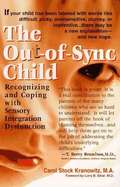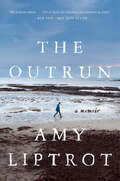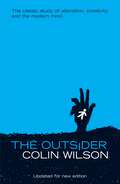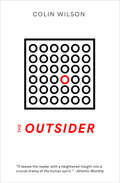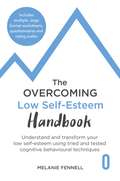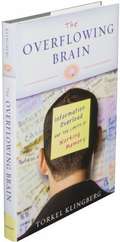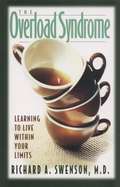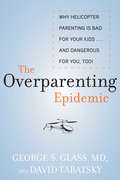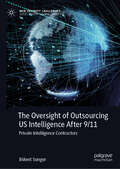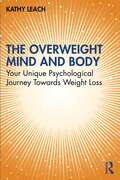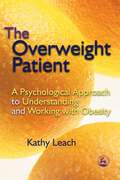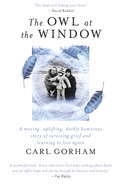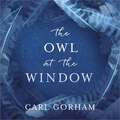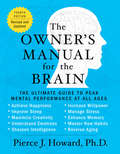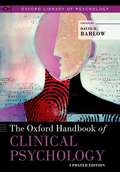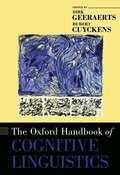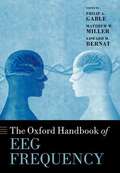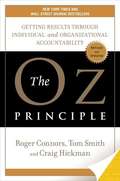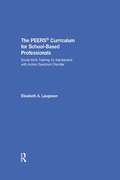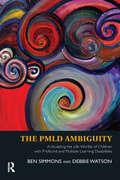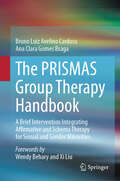- Table View
- List View
The Out-of-Sync Child: Recognizing and Coping with Sensory Integration Dysfunction
by Carol Stock Kranowitz"Difficult." "Picky." "Oversensitive." "Clumsy." "Unpredictable." "Inattentive." Children who have been labeled with words like these may actually be suffering from Sensory Integration Disorder--a very common, but frequently misdiagnosed, condition that can manifest itself in excessively high or low activity levels, problems with motor coordination, oversensitivity or undersensitivity to sensations and movements, and other symptoms. This guide, written by an expert in the field, explains how SI Dysfunction can be confused with ADD, learning disabilities, and other problems, tells how parents can recognize the problem, and offers a drug-free treatment approach for children who need help.
The Outrun: A Memoir (Canons Ser. #93)
by Amy Liptrot“It’s wild writing: sexy, unguarded, raw, and ardent … highly recommended.”—The Millions After a decade of heavy partying and hard drinking in London, Amy Liptrot returns home to Orkney, a remote island off the north of Scotland. The Outrun maps Amy’s inspiring recovery as she walks along windy coasts, swims in icy Atlantic waters, tracks Orkney’s wildlife, and reconnects with her parents, revisiting and rediscovering the place that shaped her. A Guardian Best Nonfiction Book of 2016 Sunday Times Top Ten Bestseller New Statesman Book of the Year
The Outsider
by Colin WilsonThe classic study of alienation, creativity and the modern mind'Excitingly written, with a sense of revelation' GUARDIAN'Exhaustive, luminously intelligent' OBSERVERTHE OUTSIDER was an instant literary sensation when it was first published in 1956, thrusting its youthful author into the front rank of contemporary writers and thinkers. Wilson rationalised the psychological dislocation so characteristic of Western creative thinking into a coherent theory of alienation, and defined those affected by it as a type: the outsider. Through the works and lives of various artists, including Kafka, Camus, Hemingway, Hesse, Lawrence, Van Gogh, Shaw, Nietzsche and Dostoevsky, Wilson explored the psyche of the outsider, his effect on society and society's on him. Nothing that has happened in the decades since has made THE OUTSIDER any less relevant; it remains the seminal work on this most persistent of modern-day preoccupations.
The Outsider
by Colin WilsonThe classic study of alienation, creativity and the modern mind'Excitingly written, with a sense of revelation' GUARDIAN'Exhaustive, luminously intelligent' OBSERVERTHE OUTSIDER was an instant literary sensation when it was first published in 1956, thrusting its youthful author into the front rank of contemporary writers and thinkers. Wilson rationalised the psychological dislocation so characteristic of Western creative thinking into a coherent theory of alienation, and defined those affected by it as a type: the outsider. Through the works and lives of various artists, including Kafka, Camus, Hemingway, Hesse, Lawrence, Van Gogh, Shaw, Nietzsche and Dostoevsky, Wilson explored the psyche of the outsider, his effect on society and society's on him. Nothing that has happened in the decades since has made THE OUTSIDER any less relevant; it remains the seminal work on this most persistent of modern-day preoccupations.
The Outsider: A Study Of Sexual Outsiders (Picador Bks. #Vol. 6)
by Colin WilsonThe classic study of alienation, existentialism, and how great artists have portrayed characters who exist on the margins of society. Published to immense acclaim in the mid-1950s, The Outsider helped make popular the literary concept of existentialism. Authors like Sartre, Kafka, Hemingway, and Dostoyevsky, as well as artists like Van Gogh and Nijinsky, delved for a deeper understanding of the human condition in their work, and Colin Wilson&’s landmark book encapsulated a character found time and time again: the outsider. How does the outsider influence society? And how does society influence him? It&’s a question as relevant to today&’s iconic characters, from Don Draper to Voldemort, as it was when The Outsider was initially published. A fascinating study blending philosophy, psychology, and literature, Wilson&’s seminal work is a must-have for those who are fascinated by the character of the outsider. &“Luminously intelligent . . . A real contribution to our understanding of our deepest predicament.&” —Philip Toynbee &“Leaves the reader with a heightened insight into a crucial drama of the human spirit.&” —Atlantic Monthly
The Overcoming Low Self-esteem Handbook: Understand and Transform Your Self-esteem Using Tried and Tested Cognitive Behavioural Techniques
by Dr Melanie FennellBoost your confidence and change your life for the betterLow self-esteem can make life difficult in all sorts of ways. It can make you anxious and unhappy, tormented by doubts and self-critical thoughts. It can get in the way of feeling at ease with other people and stop you from leading the life you want to lead. It makes it hard to value and appreciate yourself in the same way you would another person you care about.Melanie Fennell's acclaimed and bestselling self-help guide Overcoming Low Self-esteem has become a classic of self-help literature, winning widespread praise for its practical and user-friendly approach. At last, this benchmark work is available as a large format, practical manual, complete with worksheets, diaries and exercises.The Overcoming Low Self-esteem Handbook will help you to understand your low self-esteem and break out of the vicious circle of self-destructive thinking, distress and unhelpful behaviour. Using practical techniques from cognitive behavioural therapy (CBT), this book will help you learn the art of self-acceptance and so transform your sense of yourself for the better. Specifically, you will:· Find out how low self-esteem develops and what keeps it going· Question your negative thoughts and the attitudes that underlie them· Identify your strengths and good qualities, allow yourself to enjoy life to the full, and discover a more balanced, kindly view of yourself· Trace your progress, monitor your behaviour and record step-by-step improvementsIdeal for working through on your own or with guided assistance, this is a complete step-by-step treatment guide.Overcoming self-help guides use clinically proven techniques to treat long-standing and disabling conditions, both psychological and physical. Many guides in the Overcoming series are recommended under the Reading Well scheme.Series Editor: Emeritus Professor Peter Cooper
The Overcoming Low Self-esteem Handbook: Understand and Transform Your Self-esteem Using Tried and Tested Cognitive Behavioural Techniques
by Melanie FennellBoost your confidence and change your life for the betterLow self-esteem can make life difficult in all sorts of ways. It can make you anxious and unhappy, tormented by doubts and self-critical thoughts. It can get in the way of feeling at ease with other people and stop you from leading the life you want to lead. It makes it hard to value and appreciate yourself in the same way you would another person you care about.Melanie Fennell's acclaimed and bestselling self-help guide Overcoming Low Self-esteem has become a classic of self-help literature, winning widespread praise for its practical and user-friendly approach. At last, this benchmark work is available as a large format, practical manual, complete with worksheets, diaries and exercises.The Overcoming Low Self-esteem Handbook will help you to understand your low self-esteem and break out of the vicious circle of self-destructive thinking, distress and unhelpful behaviour. Using practical techniques from cognitive behavioural therapy (CBT), this book will help you learn the art of self-acceptance and so transform your sense of yourself for the better. Specifically, you will:· Find out how low self-esteem develops and what keeps it going· Question your negative thoughts and the attitudes that underlie them· Identify your strengths and good qualities, allow yourself to enjoy life to the full, and discover a more balanced, kindly view of yourself· Trace your progress, monitor your behaviour and record step-by-step improvementsIdeal for working through on your own or with guided assistance, this is a complete step-by-step treatment guide.Overcoming self-help guides use clinically proven techniques to treat long-standing and disabling conditions, both psychological and physical. Many guides in the Overcoming series are recommended under the Reading Well scheme.Series Editor: Emeritus Professor Peter Cooper
The Overflowing Brain
by Elkhonon Goldberg Torkel KlingbergAs the pace of technological change accelerates, we are increasingly experiencing a state of information overload. Statistics show that we are interrupted every three minutes during the course of the work day. Multitasking between email, cell-phone, text messages, and four or five websites while listening to an iPod forces the brain to process more and more informaton at greater and greater speeds. And yet the human brain has hardly changed in the last 40,000 years. Are all these high-tech advances overtaxing our Stone Age brains or is the constant flood of information good for us, giving our brains the daily exercise they seem to crave? In The Overflowing Brain, cognitive scientist Torkel Klingberg takes us on a journey into the limits and possibilities of the brain. He suggests that we should acknowledge and embrace our desire for information and mental challenges, but try to find a balance between demand and capacity. Klingberg explores the cognitive demands, or "complexity," of everyday life and how the brain tries to meet them. He identifies different types of attention, such as stimulus-driven and controlled attention, but focuses chiefly on "working memory," our capacity to keep information in mind for short periods of time. Dr Klingberg asserts that working memory capacity, long thought to be static and hardwired in the brain, can be improved by training, and that the increasing demands on working memory may actually have a constructive effect: as demands on the human brain increase, so does its capacity. The book ends with a discussion of the future of brain development and how we can best handle information overload in our everyday lives. Klingberg suggests how we might find a balance between demand and capacity and move from feeling overwhelmed to deeply engaged.
The Overload Syndrome: Learning to Live Within Your Limits
by Richard A. SwensonAnyone living in today's society knows the struggle of trying to handle busyness. You feel tired, stressed, and burned out. These symptoms are signs that you're suffering from the Overload Syndrome. This book examines where overload comes from and what it can lead to while offering prescriptions to counteract its effects and restore time to rest and space to heal. Find the secrets of time management while examining your priorities and seeking God's will.
The Overparenting Epidemic: Why Helicopter Parenting Is Bad for Your Kids... and Dangerous for You, Too!
by David Tabatsky M.D. George GlassHelicopter parents, tiger moms, cosseters, hothouse parents . . .Whatever we label it, overparenting--anxious, invasive, overly attentive, and competitive parenting--may have finally backfired. <P><P>As we witness the first generation of overparented children becoming adults in their own right, many studies show that when baby boomer parents intervene inappropriately--with too much advice, excessive favors, and erasing obstacles that kids should negotiate themselves--their "millennial" children end up ill-behaved, anxious, narcissistic, entitled youths unable to cope with everyday life. The obsession with providing everything a child could possibly need, from macrobiotic cupcakes to 24/7 tutors, has created epidemic levels of depression and stress in our country's youth, but this can be avoided if parents would just take a giant step back, check their ambitions at the door, and do what's really best for their kids.Written by a noted psychiatrist and a parenting specialist, The Overparenting Epidemic is a science-based yet humorous and practical book that features an easy-to-read menu of pragmatic, reasonable advice for how to parent children effectively and lovingly without overdoing it, especially in the context of today's demanding world.
The Oversight of Outsourcing US Intelligence After 9/11: Private Intelligence Contractors (New Security Challenges)
by Bülent SungurThis book is a story about Private Intelligence Contractors (PICs) and their relationship with the United States executive and legislative principals in the War on Terror when the line between the public and private sectors has been increasingly blurred. PICs have challenged the traditional approach which assumes that sensitive intelligence tasks should be performed by government officials because of their importance for national security. So this book examines the principal-agent relationship and the oversight problem between PICs, the US Intelligence Community (IC), the president and Congress after the 9/11 attacks. The book demonstrates that by exploiting information asymmetry, adversely selected PICs can violate legislative rules and goals such as by performing inherently governmental tasks, colluding with the IC, capturing the control of the task and contractual process, abuse, waste and fraud. In addition, to get around congressional oversight and achieve his or her hidden agenda, the executive principal can also mismanage contractors through the IC or delegate contractors to perform inherently governmental tasks.
The Overweight Mind and Body: Your Unique Psychological Journey Towards Weight Loss
by Kathy LeachThe Overweight Mind and Body is a self-help guide to understanding the psychological issues that lead to overeating and weight gain. The book enables the reader to discover the psychological drives that lead to unwanted weight and to find ways of meeting those drives other than with food. It introduces a simple, user-friendly theory of Transactional Analysis to promote weight-related self-awareness. The author includes exercises that empower readers to uncover their own stories. She understands that, for many, carrying extra weight is emotionally and physically painful and so gently encourages readers to explore at their own level. She uses case studies to demonstrate the many unconscious influences on one’s eating and how, when people discover and resolve these influences, they no longer need extra food. Reading them shows that "you are not alone". This book will also be of interest to, and a useful guide for, practitioners in the caring professions who work with clients struggling with eating and overweight.
The Overweight Patient: A Psychological Approach to Understanding and Working with Obesity
by Kathy Leach`Kathy Leach provides a thoughtful, well-written text that addresses the `great weight debate' in an engaging and compassionate way.' -The Psychologist, Vol. 20, March 2007 `The main body of the book focuses on clinical work, offering insightful ways of thinking about and working with obese individuals. The text is punctuated with some very useful case examples and transcripts which guide and enlighten the readers thinking.' -The Psychologist, Vol.20, March 2007 `An excellent, clear and accessible introduction to basic transactional analysis theory and principles, providing useful examples of how this form of therapy can be particularly useful and effective when working with people who overeat.' -The Psychologist, Vol.20, March 2007 `An important contribution in helping clinicians and clients understand the psychological aspects that prevent people form losing weight or maintaining weight loss. It is a `must-have' text for anybody working with this client group.' -The Psychologist, Vol.20, March 2007 `The Overweight Patient provides a practical framework to psychological management of obesity. Kathy Leach employs a model of Transactional Analysis psychotherapy to the treatment of obesity. She clearly writes from her considerable clinical experience. The factual information presented in this interesting book conveys the sense of someone steeped in that patient population. It is well written, with a light touch, and I found myself reading it in a single sitting. To any practitioner of transactional analysis, this will be a `must read.'' -European Eating Disorders Review, 2007 `The Overweight Patient explores the underlying beliefs and behaviours that may contribute to obesity, including psychological needs, addiction, fear of deprivation, parental influences and sexual fears. Kathy Leach draws a useful distinction between the need to eat and the need to maintain a large body size, and addresses the reasons for both long-term obesity and short-term weight gain. She provides a clear and accessible introduction to the psychoanalytic theory of Transactional Analysis and details how this approach can be used with overweight people, and as a self-help methodology. Kathy Leach offers sensitive advice on methods to help clients increase their self - esteem, self- awareness and motivation to develop healthier lifestyles.' -Transactions (TSTA) `Illustrated with patient histories, exercises and worked examples of techniques, this book enables therapists and health practitioners to help obese people to understand why they reach for food or maintain a large body weight, and to change their eating behaviour or live more comfortably with their size.' -Transactions (TSTA) This practical guide approaches obesity and overeating from a psychological perspective, and offers sensitive methods to increase patients' sense of self-worth, self-knowledge, and motivation to lose weight. The Overweight Patient explores the underlying beliefs and behaviours that may contribute to obesity, including psychological needs, addiction, fear of deprivation, parental influences and sexual fears. Kathy Leach draws a useful distinction between the need to eat and the need to maintain a large body size, and addresses the reasons for both long-term obesity and short-term weight gain. She provides a clear and accessible introduction to the psychoanalytic theory of Transactional Analysis and details how this approach can be used with overweight people. Illustrated with patient histories, exercises and worked examples of techniques, this book enables therapists and health practitioners to help obese people come to terms with their size, or to support their decision to change their behaviour and reduce their need to eat.
The Overweight Patient: A Psychological Approach to Understanding and Working with Obesity
by Kathy Leach`Kathy Leach provides a thoughtful, well-written text that addresses the `great weight debate' in an engaging and compassionate way.' -The Psychologist, Vol. 20, March 2007 `The main body of the book focuses on clinical work, offering insightful ways of thinking about and working with obese individuals. The text is punctuated with some very useful case examples and transcripts which guide and enlighten the readers thinking.' -The Psychologist, Vol.20, March 2007 `An excellent, clear and accessible introduction to basic transactional analysis theory and principles, providing useful examples of how this form of therapy can be particularly useful and effective when working with people who overeat.' -The Psychologist, Vol.20, March 2007 `An important contribution in helping clinicians and clients understand the psychological aspects that prevent people form losing weight or maintaining weight loss. It is a `must-have' text for anybody working with this client group.' -The Psychologist, Vol.20, March 2007 `The Overweight Patient provides a practical framework to psychological management of obesity. Kathy Leach employs a model of Transactional Analysis psychotherapy to the treatment of obesity. She clearly writes from her considerable clinical experience. The factual information presented in this interesting book conveys the sense of someone steeped in that patient population. It is well written, with a light touch, and I found myself reading it in a single sitting. To any practitioner of transactional analysis, this will be a `must read.'' -European Eating Disorders Review, 2007 `The Overweight Patient explores the underlying beliefs and behaviours that may contribute to obesity, including psychological needs, addiction, fear of deprivation, parental influences and sexual fears. Kathy Leach draws a useful distinction between the need to eat and the need to maintain a large body size, and addresses the reasons for both long-term obesity and short-term weight gain. She provides a clear and accessible introduction to the psychoanalytic theory of Transactional Analysis and details how this approach can be used with overweight people, and as a self-help methodology. Kathy Leach offers sensitive advice on methods to help clients increase their self - esteem, self- awareness and motivation to develop healthier lifestyles.' -Transactions (TSTA) `Illustrated with patient histories, exercises and worked examples of techniques, this book enables therapists and health practitioners to help obese people to understand why they reach for food or maintain a large body weight, and to change their eating behaviour or live more comfortably with their size.' -Transactions (TSTA) This practical guide approaches obesity and overeating from a psychological perspective, and offers sensitive methods to increase patients' sense of self-worth, self-knowledge, and motivation to lose weight. The Overweight Patient explores the underlying beliefs and behaviours that may contribute to obesity, including psychological needs, addiction, fear of deprivation, parental influences and sexual fears. Kathy Leach draws a useful distinction between the need to eat and the need to maintain a large body size, and addresses the reasons for both long-term obesity and short-term weight gain. She provides a clear and accessible introduction to the psychoanalytic theory of Transactional Analysis and details how this approach can be used with overweight people. Illustrated with patient histories, exercises and worked examples of techniques, this book enables therapists and health practitioners to help obese people come to terms with their size, or to support their decision to change their behaviour and reduce their need to eat.
The Owl at the Window: A memoir of loss and hope
by Carl GorhamThe Owl at the Window is a dramatic, moving and funny memoir. An emotional, ultimately uplifting tale of loss and hope.'Amazing and completely compelling...both funny and sad, and so moving, I couldn't put it down.' - Alison Steadman'Devastatingly moving and hilarious in equal measure. I have laughed and cried during the reading of a single sentence.' - Caroline QuentinWinner of Best Memoir at the East Anglian Book Awards'She is dead. She was here just now and she was alive. How can she suddenly be dead? People in history are dead. Old people are dead. Grandparents are dead. Other people are dead. Not people like me. Not this person. The person I was married to. Had a child with. Not the person who was standing next to me. Chatting. Laughing. Being.'Shock is just one of many emotions explored in award-winning TV comedy writer Carl Gorham's account of his bereavement which is by turns deeply moving and darkly humorous.Part love story, part widower's diary, part tales of single parenting, it tells of his wife's cancer, her premature death and his attempts to rebuild his life afterwards with his six -year old daughter. Realised in a series of vivid snapshots, it takes the reader on an extraordinary journey from Oxford to Australia, from Norfolk to Hong Kong through fear, despair, pain and anger to hope, laughter and renewal.The Owl at the Window is a fresh and original exploration of what it means to lose a partner in your forties, and how Carl learned to live again.
The Owl at the Window: A memoir of loss and hope
by Carl GorhamThe Owl at the Window is a dramatic, moving and funny memoir. An emotional, ultimately uplifting tale of loss and hope.'Amazing and completely compelling...both funny and sad, and so moving, I couldn't put it down.' - Alison Steadman'Devastatingly moving and hilarious in equal measure. I have laughed and cried during the reading of a single sentence.' - Caroline QuentinWinner of Best Memoir at the East Anglian Book Awards'She is dead. She was here just now and she was alive. How can she suddenly be dead? People in history are dead. Old people are dead. Grandparents are dead. Other people are dead. Not people like me. Not this person. The person I was married to. Had a child with. Not the person who was standing next to me. Chatting. Laughing. Being.'Shock is just one of many emotions explored in award-winning TV comedy writer Carl Gorham's account of his bereavement which is by turns deeply moving and darkly humorous.Part love story, part widower's diary, part tales of single parenting, it tells of his wife's cancer, her premature death and his attempts to rebuild his life afterwards with his six -year old daughter. Realised in a series of vivid snapshots, it takes the reader on an extraordinary journey from Oxford to Australia, from Norfolk to Hong Kong through fear, despair, pain and anger to hope, laughter and renewal.The Owl at the Window is a fresh and original exploration of what it means to lose a partner in your forties, and how Carl learned to live again.
The Owl at the Window: A memoir of loss and hope
by Carl GorhamWinner of Best Memoir at the East Anglian Book Awards'She is dead. She was here just now and she was alive. How can she suddenly be dead? People in history are dead. Old people are dead. Grandparents are dead. Other people are dead. Not people like me. Not this person. The person I was married to. Had a child with. Not the person who was standing next to me. Chatting. Laughing. Being.' Shock is just one of many emotions explored in award-winning TV comedy writer Carl Gorham's account of his bereavement which is by turns deeply moving and darkly humorous.Part love story, part widower's diary, part tales of single parenting, it tells of his wife's cancer, her premature death and his attempts to rebuild his life afterwards with his six -year old daughter. Realised in a series of vivid snapshots, it takes the reader on an extraordinary journey from Oxford to Australia, from Norfolk to Hong Kong through fear, despair, pain and anger to hope, laughter and renewal.The Owl at the Window is a fresh and original exploration of what it means to lose a partner in your forties, and how Carl learned to live again.(P)2017 Hodder & Stoughton
The Owner's Manual for the Brain (4th Edition)
by Pierce HowardCutting-edge, user-friendly, and comprehensive: the revolutionary guide to the brain, now fully revised and updatedAt birth each of us is given the most powerful and complex tool of all time: the human brain. And yet, as we well know, it doesn't come with an owner's manual--until now. In this unsurpassed resource, Dr. Pierce J. Howard and his team distill the very latest research and clearly explain the practical, real-world applications to our daily lives. Drawing from the frontiers of psychology, neurobiology, and cognitive science, yet organized and written for maximum usability, The Owner's Manual for the Brain, Fourth Edition, is your comprehensive guide to optimum mental performance and well-being. It should be on every thinking person's bookshelf. What are the ingredients of happiness? Which are the best remedies for headaches and migraines? How can we master creativity, focus, decision making, and willpower? What are the best brain foods? How is it possible to boost memory and intelligence? What is the secret to getting a good night's sleep? How can you positively manage depression, anxiety, addiction, and other disorders? What is the impact of nutrition, stress, and exercise on the brain? Is personality hard-wired or fluid? What are the best strategies when recovering from trauma and loss? How do moods and emotions interact? What is the ideal learning environment for children? How do love, humor, music, friendship, and nature contribute to well-being? Are there ways of reducing negative traits such as aggression, short-temperedness, or irritability? What is the recommended treatment for concussions? Can you delay or prevent Alzheimer's and dementia? What are the most important ingredients to a successful marriage and family? What do the world's most effective managers know about leadership, motivation, and persuasion? Plus 1,000s more topics!
The Oxford Handbook Of Clinical Psychology (Oxford Library Of Psychology)
by David H. BarlowThe exponential growth of clinical psychology since the late 1960s can be measured in part by the extensive-perhaps exhaustive-literature on the subject. This proliferation of writing has continued into the new century, and the field has come to be defined as much by its many topics as its many voices. <p><p> In addition to core sections on topics such as training, assessment, diagnosis, and intervention, the handbook includes valuable chapters devoted to new and emerging issues in the clinical field, including heath care reforms, cultural factors, and technological innovations and challenges. Each chapter offers a review of the most pertinent literature, outlining current issues and identifying possibilities for future research. <p> Featuring two chapters by Editor David H. Barlow -- one on changes during his own 40-year odyssey in the field, the other projecting ten themes for the future of clinical psychology -- The Oxford Handbook of Clinical Psychology is a landmark publication that is sure to serve as the field's benchmark reference publication for years to come. It is an essential resource for students, clinicians, and researchers across the ever-growing clinical psychology community.
The Oxford Handbook of Cognitive Linguistics
by Dirk Geeraerts Hubert CuyckensThe Oxford Handbook of Cognitive Linguistics presents a comprehensive overview of the main theoretical concepts and descriptive/theoretical models of Cognitive Linguistics, and covers its various subfields, theoretical as well as applied. The first twenty chapters give readers the opportunity to acquire a thorough knowledge of the fundamental analytic concepts and descriptive models of Cognitive Linguistics and their background. The book starts with a set of chapters discussing different conceptual phenomena that are recognized askey concepts in Cognitive Linguistics: prototypicality, metaphor, metonymy, embodiment, perspectivization, mental spaces, etc. A second set of chapters deals with Cognitive Grammar, Construction Grammar, and Word Grammar, which, each in their own way, bring together the basic concepts into aparticular theory of grammar and a specific model for the description of grammatical phenomena. Special attention is given to the interrelation between Cognitive and Construction Grammar. A third set of chapters compares Cognitive Linguistics with other forms of linguistic research (functionallinguistics, autonomous linguistics, and the history of linguistics), thus giving a readers a better grip on the position of Cognitive Linguistics within the landscape of linguistics at large. The remaining chapters apply these basic notions to various more specific linguistic domains, illustrating how Cognitive Linguistics deals with the traditional linguistic subdomains (phonology, morphology, lexicon, syntax, text and discourse), and demonstrating how it handles linguistic variationand change. Finally they consider its importance in the domain of Applied Linguistics, and look at interdisciplinary links with research fields such as philosophy and psychology. With a well-known cast of contributors from around the world, this reference work will be of interest to researchers and advanced students in (cognitive) linguistics, psychology, cognitive science, and anthropology.
The Oxford Handbook of EEG Frequency (Oxford Library of Psychology Series)
by Matthew Miller Philip Gable Edward BernatThe use of electroencephalography (EEG) to study the human mind has seen tremendous growth across a vast array of disciplines due to increased ease of use and affordability of the technology. Typically, researchers study how the magnitude of the waves changes over time or how the rhythm (frequency) of the waves changes over time. <p><p>The Oxford Handbook of EEG Frequency is arguably the first book to comprehensively describe the ways to study how the frequency of the waves changes over time and how changes in frequency are linked to cognitive, affective, and motor processes.
The Oz Principle: Getting Results Through Personal and Organizational Accountability
by Tom E. C. Smith Roger Connors Craig HickmanUsing the wizard of oz and its characters as a metaphor, this book gives lots of examples and practical steps people and organizational leaders can take to improve organizational accountability. The authors contend that we need to reframe how we think of accountability -- it's not about playing the "blame game", it's about taking responsibility for what we do and figuring out how we can rise above the things that happen to us and to the places we work that we can't control and achieve the results we want to achieve. Although a bit simplistic and self-promotional, this book lays out some good principles that, if followed, would make our worklife and personal lives better, richer and more fulfilling
The PEERS® Curriculum for School Based Professionals: Social Skills Training for Adolescents With Autism Spectrum Disorder
by Elizabeth A. LaugesonThe PEERS® Curriculum for School-Based Professionals brings UCLA's highly acclaimed and widely popular PEERS program into the school setting. This sixteen-week program, clinically proven to significantly improve social skills and social interactions among teens with autism spectrum disorder, is now customized for the needs of psychologists, counselors, speech pathologists, administrators, and teachers. The manual is broken down into clearly divided lesson plans, each of which have concrete rules and steps, corresponding homework assignments, plans for review, and unique, fun activities to ensure that teens are comfortable incorporating what they've learned. The curriculum also includes parent handouts, tips for preparing for each lesson, strategies for overcoming potential pitfalls, and the research underlying this transformative program.
The PMLD Ambiguity: Articulating the Life-Worlds of Children with Profound and Multiple Learning Disabilities
by Ben Simmons Debbie WatsonThis book challenges the very idea of "profound and multiple learning disabilities" (PMLD) itself, and what constitutes appropriate educational provision for children described as having PMLD. It considers the role of ambiguity in articulating the life-worlds of children with PMLD.
The PRISMAS Group Therapy Handbook: A Brief Intervention Integrating Affirmative and Schema Therapy for Sexual and Gender Minorities
by Bruno Luiz Cardoso Ana Clara BragaThis handbook presents and describes how to apply the PRISMAS Group Therapy, a brief intervention that combines Affirmative and Schema Therapy for Sexual and Gender Minorities (SGM). PRISMAS is a new therapeutic intervention that builds upon the concepts of Schema Therapy to create a brief group intervention aimed at helping SGM cope with the stress and prejudice they have internalized by living in societies that stigmatize and attack the LGBTQIA+ community. This intervention manual provides a detailed breakdown of the 12 therapeutic sessions in which the intervention is organized, showing practitioners how to conduct it. The PRISMAS Group Therapy Handbook: A Brief Intervention Integrating Affirmative and Schema Therapy for Sexual and Gender Minorities will be an invaluable resource for psychotherapists, clinical psychologists and other mental health professionals working with Sexual and Gender Minorities. &“While Schema Therapy offers a broad range of applications, there remains a gap in understanding how its principles apply to minority groups, including LGBTQIA+ individuals. Bruno&’s work in this area is groundbreaking. His research on minority stress and the inner critic (oppressive sociocultural) schema mode sheds light on how societal influences shape individual experiences, schemas, and modes.&” – Wendy Behary, Former President, The International Society of Schema Therapy (ISST) &“Bruno and Ana present a framework that is both sexual and gender affirming. It resonates across borders by addressing the shared experiences of minority stress, internalized oppression, and systemic barriers faced by SGM communities worldwide. By bridging societal oppression with individual healing, their approach fully leverages the integrative potential of Schema Therapy. Bruno and Ana&’s work is a gift to the field of psychotherapy.&” – Xi Liu, Co-Director, SchemXcollective: Integrative Schema Institute Sydney, Australia The original manuscript of this book was written in Portuguese and translated into English with the help of artificial intelligence. A subsequent human revision was done primarily in terms of content.
